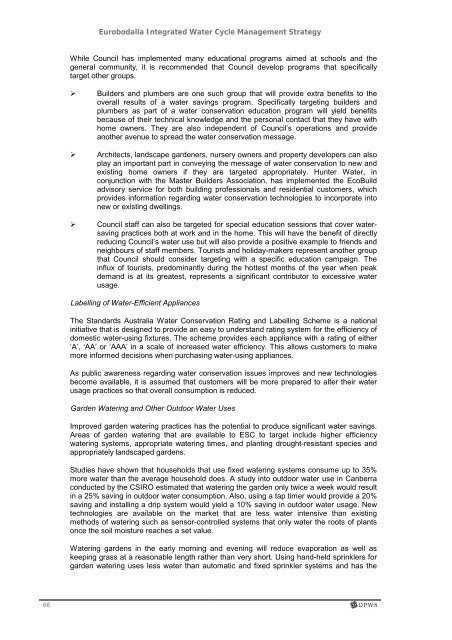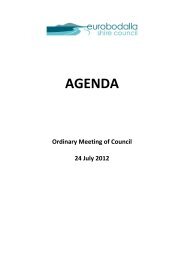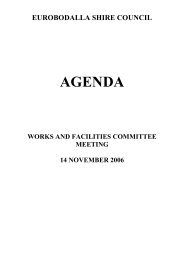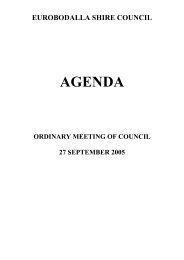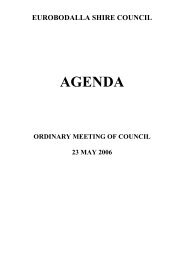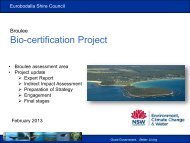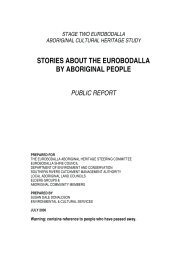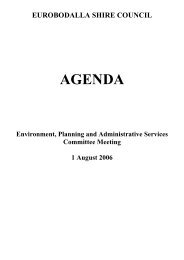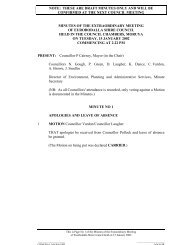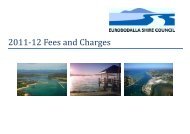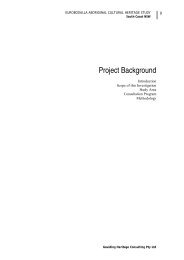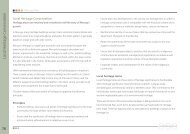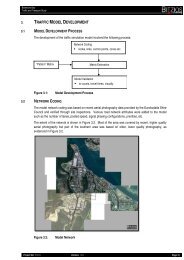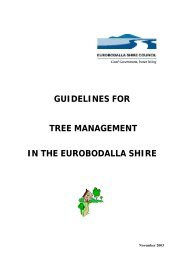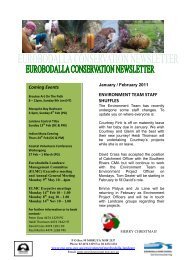Eurobodalla Integrated Water Cycle Management Strategy
Eurobodalla Integrated Water Cycle Management Strategy
Eurobodalla Integrated Water Cycle Management Strategy
Create successful ePaper yourself
Turn your PDF publications into a flip-book with our unique Google optimized e-Paper software.
66<br />
<strong>Eurobodalla</strong> <strong>Integrated</strong> <strong>Water</strong> <strong>Cycle</strong> <strong>Management</strong> <strong>Strategy</strong><br />
While Council has implemented many educational programs aimed at schools and the<br />
general community, it is recommended that Council develop programs that specifically<br />
target other groups.<br />
Builders and plumbers are one such group that will provide extra benefits to the<br />
overall results of a water savings program. Specifically targeting builders and<br />
plumbers as part of a water conservation education program will yield benefits<br />
because of their technical knowledge and the personal contact that they have with<br />
home owners. They are also independent of Council’s operations and provide<br />
another avenue to spread the water conservation message.<br />
Architects, landscape gardeners, nursery owners and property developers can also<br />
play an important part in conveying the message of water conservation to new and<br />
existing home owners if they are targeted appropriately. Hunter <strong>Water</strong>, in<br />
conjunction with the Master Builders Association, has implemented the EcoBuild<br />
advisory service for both building professionals and residential customers, which<br />
provides information regarding water conservation technologies to incorporate into<br />
new or existing dwellings.<br />
Council staff can also be targeted for special education sessions that cover watersaving<br />
practices both at work and in the home. This will have the benefit of directly<br />
reducing Council’s water use but will also provide a positive example to friends and<br />
neighbours of staff members. Tourists and holiday-makers represent another group<br />
that Council should consider targeting with a specific education campaign. The<br />
influx of tourists, predominantly during the hottest months of the year when peak<br />
demand is at its greatest, represents a significant contributor to excessive water<br />
usage.<br />
Labelling of <strong>Water</strong>-Efficient Appliances<br />
The Standards Australia <strong>Water</strong> Conservation Rating and Labelling Scheme is a national<br />
initiative that is designed to provide an easy to understand rating system for the efficiency of<br />
domestic water-using fixtures. The scheme provides each appliance with a rating of either<br />
‘A’, ‘AA’ or ‘AAA’ in a scale of increased water efficiency. This allows customers to make<br />
more informed decisions when purchasing water-using appliances.<br />
As public awareness regarding water conservation issues improves and new technologies<br />
become available, it is assumed that customers will be more prepared to alter their water<br />
usage practices so that overall consumption is reduced.<br />
Garden <strong>Water</strong>ing and Other Outdoor <strong>Water</strong> Uses<br />
Improved garden watering practices has the potential to produce significant water savings.<br />
Areas of garden watering that are available to ESC to target include higher efficiency<br />
watering systems, appropriate watering times, and planting drought-resistant species and<br />
appropriately landscaped gardens.<br />
Studies have shown that households that use fixed watering systems consume up to 35%<br />
more water than the average household does. A study into outdoor water use in Canberra<br />
conducted by the CSIRO estimated that watering the garden only twice a week would result<br />
in a 25% saving in outdoor water consumption. Also, using a tap timer would provide a 20%<br />
saving and installing a drip system would yield a 10% saving in outdoor water usage. New<br />
technologies are available on the market that are less water intensive than existing<br />
methods of watering such as sensor-controlled systems that only water the roots of plants<br />
once the soil moisture reaches a set value.<br />
<strong>Water</strong>ing gardens in the early morning and evening will reduce evaporation as well as<br />
keeping grass at a reasonable length rather than very short. Using hand-held sprinklers for<br />
garden watering uses less water than automatic and fixed sprinkler systems and has the


